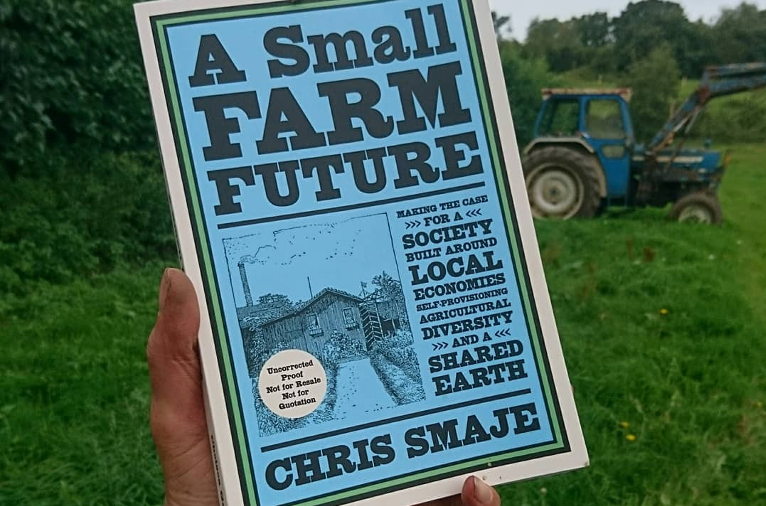My last post concerning rural gentrification led into the wider issue of future migration patterns, which I’ll address briefly here. I haven’t got much to say about it that I haven’t already said either here or in my book but maybe a little repetition is warranted.
As I see it, human movement within and between countries is likely to be a massive reality in the years to come, and the ‘rural gentrification’ trend among contemporary neo-agrarian homesteaders discussed in my previous post is merely a straw in the wind presaging it. Globally, estimates from international agencies suggest that anywhere between 200 million and a billion people could be displaced from their homes and potentially on the move over the next few decades as a result of climate change. Independently and in concert, changing economic realities seem likely to be another large impetus.
At a more granular level, some researchers question such headlines on the grounds that even when prompted by ‘natural’ phenomena like droughts or floods, migration always involves multifaceted human responses that modulate expected scales and directions of movement. Such caveats are always worth bearing in mind, especially when the idea of impending large-scale migration is so routinely used to stoke fear and generate all kinds of political mischief. All the same, in view of the climate, energy, water, soil, political and economic realities before us, I find it hard to imagine that the human world to come won’t involve migrations of a different order.
Initially, much of that migration seems likely to be relatively localized and inter-urban or rural-to-urban. Long-term, it’ll be urban-to-rural. The brute reality is that current global settlement patterns are based on flows of energy, water and money that aren’t sustainable in the long run, so those patterns will change. Given that reality, change wrought by large-scale human migration within but also between countries looks like the least disastrous way that it will happen.
I’ve sometimes been criticized for being ‘pro-migration’ – not least in the Twitter thread that generated this mini-series of blog posts. But in the face of what’s to come, saying that one is pro or anti migration is beside the point. You might as well say you’re for or against the weather. Like it or not, it’s going to happen. The real question is how you respond to it.
To state my position: I’m not especially ‘pro’ migration, but nor am I anti-migrant. In an ideal world, I’d like it if people didn’t routinely have to travel in large numbers far from their homeplace to make a livelihood. So, rather than being pro-migration, I’d describe myself as pro the right not to have to migrate. The challenge is how to make it feasible for the majority of the world’s people to exercise that right. In one of the essays that generated this blog mini-series, Anarcho-Contrarian suggested various income and property tax measures to help keep people rooted to their homeplace. I largely agree with them, but I don’t think they’d be enough to do the job in the present global moment. I’d suggest the following three policies in the wealthier countries, starting tomorrow, might to the job:
- A ratchet tax on fossil fuels, perhaps something of the order of an extra 5p per litre of petrol retail per week (that’s about $0.26 per gallon of gas in US units, if I’ve got my sums right) levied across the whole supply chain
- A 100% death or inheritance tax above a small cutoff point, say £5,000 (US$6,750) cash or one acre of farmland (farmland is currently selling at about £9,000 per acre in England at present – though another view would be that farmland isn’t currently selling in England)
- According rights to national and local governments worldwide to limit the inflow and outflow of capital within their jurisdictions
No doubt there’s scope for a few tweaks to these policies, but without something like them the combination of climate breakdown and the concentration of wealth will be such that a lot of people will be on the move in the coming years in search of a decent livelihood, or even of bare survival. My sense is that a lot of localist objections to in-migrants of various kinds are basically objections to the social and economic hollowing out and decline of place which results more from the flow of money than the flow of people. Certainly, there’s no prospect of reducing the latter without radical change to the former.
But sadly, I doubt such policies will be enacted anywhere. Much more likely is the proliferation of border walls and border militarization of one sort or another (US-Mexico, India-Bangladesh, N/W-S/E Mediterranean etc) the result of which will be a lot of death and suffering on the outer side of the borders and increasing civic degradation on the inner side to the point where in some places it may become debatable whether life is really better on the inside than the outside. And at the end of it all, in history measured by decades or centuries, I doubt it’ll do much to stop the redistribution of the global population that would have happened if the borders had just stayed open. Better to address climate change and capital migration now?
Those of us who live in a rural part of a high-latitude country where the future prospects for food production remain reasonably good can expect to see a lot of in-migration in the coming decades. I don’t doubt this will cause frictions, but I’m not especially sympathetic towards attempts by the existing residents of those places to keep the migrants out. Such residents have been the beneficiaries, albeit not usually the main beneficiaries, of the capital inflows and greenhouse gas emissions fuelling the migration. Those in glasshouses should not throw stones.
The same cliché probably serves yet more so for ex-urban sophisticates with a tendency to disparage the countryside and country folk, if and when they join the exodus from the cities. Get your acre and learn to homestead. Who’s the bumpkin now?
But I don’t want to get too oppositional about this. Anarcho-Contrarian wrote of the “legitimate grudge” that rural people may hold against urban-modernist narratives that tell them “you are not good enough; your place is not good enough” and whose “children and grandchildren were functionally confiscated from them”. I agree, but their children and grandchildren will soon be coming home, and they will not be the same kind of people they would have been had they never left.
This isn’t necessarily a bad thing provided the returnees don’t come back with a sense of innate superiority – which is less likely if they’re returning in the face of urban crises and meltdowns. There’s nothing intrinsically wrong with spending some time away from home and learning new things on other stages. Perhaps other societies outside the modern western one have done a better job of melding the so-called ‘great tradition’ of urban literate ‘high’ religious culture with the ‘little tradition’ of rural oral culture. In The Shepherd’s Life, James Rebanks recounts his alienating high school education that forced ‘great tradition’ culture down the throats of kids grounded in the practicalities of local farming life, his later enthrallment with the world of books that took him to Oxford University as a mature student, and then his return to sheep farming. There’s scope for more people’s lives to take such a course, ideally without each chapter involving such grating disjunctions.
Likewise, the pressure of in-migration to productive rural places may be positive inasmuch as it forces new patterns of more sustainable land use and landownership (ie. small-scale, self-reliant homesteading or smallholding), an argument I propounded in Part IV of A Small Farm Future. There are those who want to frame such changes in terms of class struggle, which may turn out to be the case in some places. But it seems to me unlikely that these class struggles will bear much relation to anything presaged in Marxist thinking about the class conflicts that fuelled the emergence of modern capitalism. A different and more populist lens is required. I aim to write more about it in due course.
So I guess I’m not in step with the two main stories about migration emerging respectively from the political left and right. Or maybe I’m partly in step with elements of each. I dislike the racialized stoking of fears about ‘floods’ of migrants heading from Global South to Global North or from the city to the country purveyed on the right. But migration does seem to me to raise critical social issues. It’s not just a moral panic stoked by the right, and extreme geographic or labour mobility are not intrinsically good things. ‘Floods’ of migrants has the wrong connotations, but the weather and the tides are definitely changing and unless radical policy measures are taken we’re going to see large changes in human population distributions. We’ll probably see them even if they are taken. Managing this well, avoiding individual or out-group blaming and trying to use the changes to generate positive political outcomes are important challenges. Difficult ones too.






